Alexander J. Motyl's Blog, page 26
February 28, 2012
Yanukovych Squints at a Second Term
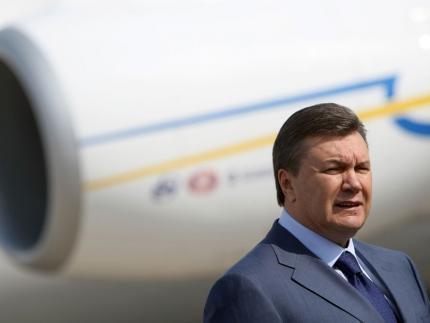
In case you missed it, President Viktor Yanukovych gave a two-hour interview on Ukraine's popular ICTV channel in February. You'll be pleased to learn that Ukraine is in tip-top shape and that things will only get better.
And the president's damned proud of his record.
"You know," he said, "I'm not ashamed to look people in the eye. And before these elections"—meaning the parliamentary elections in October—"I will look people in the eye. I always did that and I will continue doing that."
Personally, I don't doubt Yanukovych for a minute. Heck, he's president of Ukraine and Ukraine's presidents always tell the truth.
I bet you want to know whether Yanukovych would be ashamed to look Ukraine's second most prominent political prisoner, Yuri Lutsenko, in the eye. After all, the former interior minister and Orange Revolution firebrand just got a four-year sentence for the kind of alleged financial irregularities that are job requirements for Yanukovych's Party of Regions. You'd probably turn red and avert your gaze if Lutsenko stared at you, right? But that's because you never served time in the slammer and don't know that cons always look each other in the eye.
So take it from me, the far more important questions are these. Just how far away was Yanukovych from the people he claims to have looked in the eye? And did they have the opportunity to look back?
Maybe I'm just being persnickety, but here's my problem. I mean, Yanukovych lives in a palatial compound surrounded by tall fences. That can't be where he looks folks in the eye. He works in the presidential building on Bankova Street in Kyiv. Try getting inside if you're a regular Joe. When Yanukovych ventures outside, even in a hoity-toity place like Davos, he's always surrounded by an army of big guards who, despite his best efforts to crane his neck and glimpse the common folk, surely block his vision. And, as we all know, Yanukovych commutes, either in a helicopter or a limo with tinted windows (a reasonable security measure for all great men, of course).
I suppose the president actually gets to see some people from a few hundred yards away as he's flying above Kyiv or speeding down its empty avenues. And I also suppose that, if he squints real hard, he may get to see some eyes. But can he actually look into them? Probably not is my guess. Not even Superman could, and he had really great vision. But that also means that, as the president is zipping around faster than a speeding bullet, chances are Ukrainians can't see his eyes. That might even be a good thing, come to think of it. Just imagine if poor Viktor actually saw an eye or two for more than a millisecond. Gosh, if he could see Ukrainians looking back, he might want to stop looking his adoring people in the eye. And what would happen then to Ukraine's flourishing democracy?
Proud as he is, of his record and his eyesight, the prez did fess up to having experienced one thing that didn't go quite according to plan. When asked to comment about the world's outraged response to the kangaroo-court trial of Ukraine's most prominent political prisoner, Yulia Tymoshenko, Yanukovych opined: "I didn't expect there to be such a racket on the part of any country. I didn't expect them to give us orders."
Now, I know what you're thinking. You're thinking that the president of Ukraine, a country he insists is European and belongs in the EU, should have known that Europeans are a tad persnickety about unabashed political repression. But it's high time you saw things from Viktor's point of view. I mean, look. Here's a big guy who spends all his life in glossy palaces and presidential suites, in whirring helicopters and whizzing limos, surrounded by even bigger guys with broad shoulders and calloused hands. That can be really rough. Ostrich-leather shoes need to be constantly polished, Hugo Boss suits need to be pressed, and bouffant hairdos need to be maintained. And how often do you think his eagle-eyed guards get to bathe? To top it off, he's got to make strategically important decisions about his sons' pecuniary wellbeing and his pals' financial assets, while continually squinting and craning his neck in the vain hope of getting a better glimpse of people's eyes. Lemme tell you, buddy, that ain't easy. I bet you can walk and chew gum, but go ahead and try boiling an egg while squinting, craning your neck, and feeling frustrated. It can't be done, and that's a fact.
Yep, Yanukovych has a tough job, but someone's gotta do it. Small wonder that he's planning to run again. As he said during the interview, "I have the right to think about a second term."
Damned right you do, Victor. The only thing that puzzles me is this. With all that squinting and head craning amidst all that hullaballoo by those persnickety Europeans and arrogant Americans, is a second term really worth the pain in the neck? Why squint at people if you could be squinting through a scope during a fun boar shoot with the boys? Why look cons in the eye in jail when you could be looking cons in the eye on your country estate?
February 24, 2012
Cars, Chutzpah, and Crashes in Ukraine
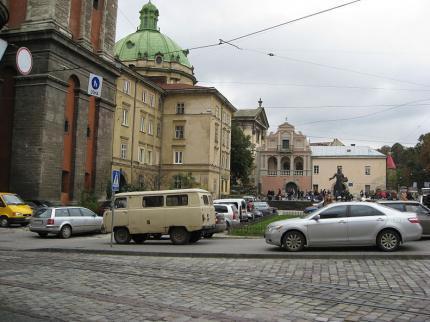
As visitors to Ukraine know, the country's automobile drivers are a menace to society. They drive too fast and too carelessly, they drink and drive and then drink some more, and they think they own the roads. That they rarely wear seatbelts goes without saying.
They're also a menace to themselves. President Yanukovych's close adviser Hanna Herman lost a son in a tragic car accident in 2009.
Take a walk in downtown Kyiv and you're likely to find that there are as many cars on the sidewalks as there are people. All of them are going somewhere, but whereas most people are polite enough to let you pass, most drivers feel that it's you who are imposing on them. A friend of mine once tried to sidestep an automobile that was bearing down on him on the sidewalk. He instinctively raised his arm and smacked the front windshield. It broke. The driver raised hell. My friend pleaded self-defense. So whom did the police arrest? My friend, of course. He got off only because he had a Canadian passport.
Naturally, drivers take to Kyiv's sidewalks because many of them are exceptionally wide and because there's insufficient room for parking. I once read that the capital city's cars, if lined up front to back, would exceed the length of its streets. So what's a driver to do? The president's solution to this problem is to commute to work by helicopter. That takes chutzpah in a poor and transportationally challenged country like Ukraine, but chutzpah is what Ukrainian fat cats do best.
And chutzpah is the real reason that cars own the sidewalks. How many of you would ever even consider parking in the middle of a sidewalk? It's just not done. And, besides, you'd get a ticket. Whoever started this trend in Kyiv felt that the normal rules of civilized urban behavior didn't apply to him and that there was nothing to fear from the cops—presumably because they were on the take or feared him.
That chutzpah is also evident in the way these guys drive—which is always too fast. Small wonder that accidents and fatalities abound, not just on highways and ill-lit country roads, but in cities. As a New Yorker, I know for a fact that New York drivers take great pride in running red lights, ignoring traffic rules, and making a nuisance of themselves. But the accidents they cause are rarely fatal, because they generally drive within the speed limit.
On February 20th, in Kyiv, six cars got involved in a big accident, and one driver suffered serious injuries. The day after, three cars got banged up in Kharkiv and two people died. If you follow the news in Ukraine, you know these sorts of incidents are pretty much a daily occurrence in the country's cities.
You also know that the cars involved in urban crashes are almost always expensive foreign models. The ones in Kyiv were a Mercedes-Benz Е 320, a Mitsubishi Lancer, a Hyundai Sonata, a Toyota Land Cruiser, a Hyundai ix35, and a Volvo S80. The ones in Kharkiv were a Mazda, a Mercedes, and a Kia.
The owners are generally Ukraine's nouveaux riches, which, by definition, means that a good number of them are policymakers or the offspring of policymakers. Unsurprisingly, like the fellow who almost ran down my friend, they appear to go scot-free after causing accidents.
So why shouldn't these guys revel in their chutzpah? They own the country and they run the country. Why can't they run it down, too?
If the Regionnaire fat cats had any sense, they'd walk to work. They'd lose a little weight, rub shoulders with the great unwashed masses they claim to love, and perhaps be in the position to win the October parliamentary elections fair and square. That'll never happen, of course, because Ukraine's elites need big cars to compensate for the smallness of their egos. If you know you're a small-time crook pretending to be a big-time player, you positively need that Armani suit and Rolex and Mercedes.
Expect the fat cats' first big encounter with reality to take place during the June UEFA football games. I'd like to see one of them bear down on some strolling British soccer fans. Windshields aren't the only things that are likely to get smashed.
The Regionnaires' next big encounter with reality will come after the parliamentary elections. They'll ignore speed limits and traffic regulations, but when they finally hit a wall, the crash will be deafening. And that tinkling noise will be the sound of their brittle chutzpah shattering.
Photo Credit: Pieter Lanser
February 17, 2012
Ukraine's Future Amidst an Unstable Russia, EU
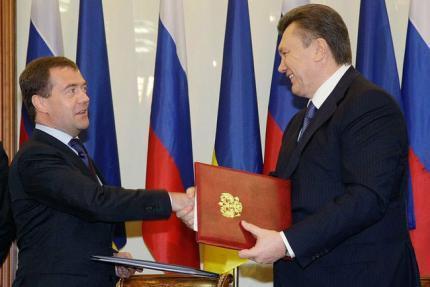
I wrote in a recent posting for this blog that Europe's troubles and Russia's turbulence herald an "unhappy new year" for Viktor Yanukovych and the Regionnaires. Let's up the ante and ask what the European Union's meltdown and Russia's breakdown might mean for Ukraine. Both possibilities may still strike us as unlikely, but, in contrast to the conventional wisdom that ruled over the last decade, they're no longer unimaginable. Indeed, one can easily imagine the EU's transformation into a loose economic association without political aspirations or a tight political-economic entity under German leadership. And one can just as easily imagine Russia's experiencing popular uprisings, coups d'etat, and regional secessionist movements that would make it a weak, brittle, and possibly even failed state.
Recall why both the EU and Russia are important for Ukraine. Economically, they're Ukraine's largest trading partners, the most significant sources of foreign direct investment, and the most important destinations for Ukrainian migrant labor. Russia is also Ukraine's prime supplier of energy. Geopolitically, Russia—with its military, atomic weapons, natural resources, and population—is a superpower compared to Ukraine, while the EU, with its incestuous relationship with a confused NATO, represents only a minor balancing opportunity for Ukraine. Normatively, Russia's authoritarianism is a source of emulation for Ukrainian authoritarians, while EU democracy is a source of inspiration for Ukrainian democrats. Culturally, Russia exerts a far greater pull on Ukraine—via proximity, open borders, population, and media hegemony—than the more distant and more aloof EU.
A simultaneous economic decline in both the EU and Russia will knock the wind out of Ukraine's economy. Trade, investment, and migrant remittances will fall, while Ukraine's unemployment rate will rise and GDP will crash. Worse, energy flows could be disrupted, while natural gas is likely to become even more expensive. In sum, Ukraine's economy could experience another 1990s-style depression, and social tensions, possibly even mass revolts, are certain. With their backs to the wall, Ukraine's elites may finally have to choose between packing their bags or reforming the country. They won't be able to count on Russia or the EU to save them and they won't have Russia or the EU to blame for their own incompetence and venality. When forced to sink or swim, Ukraine might finally begin swimming. Or not.
In contrast to an economic breakdown, a geopolitical breakdown could on balance actually enhance Ukraine's security. Europe isn't much of a geopolitical player anyway, and a decline of its military capacities won't make much of a difference. Russia's transformation into a weak, weaker, or even failed state, on the other hand, will be a significant boon to Ukraine's geopolitical status. Indeed, all of Russia's non-Russian neighbors will breathe more easily with the decline of a superpower with a predilection for neo-imperial rhetoric. The potential downside is that a Russian breakdown could result in civil war, secessionist struggles, mass refugees, loose nukes, and hyper-nationalist rhetoric that will, willy-nilly, affect Ukraine's, as well as Eurasia's, security. Facing direct threats to their sovereignty, Russia's non-Russian neighbors will beef up their militaries and police apparatuses, strengthen border controls, and emphasize their identities as separate states and nations. Under conditions such as these, Ukraine's army may finally be transformed into a genuine military. Ukraine's integrity as a state will also be boosted: no one will want to secede, as there will be no place to secede to.
State building under conditions of outside threats is rarely good for democracy, but, in Ukraine's case, the outcome isn't so clear. After all, the main source of authoritarian legitimation in Ukraine is Russian authoritarianism. If the latter fails, then the prospects for the former correspondingly grow weaker. Of course, if the EU fails, then that source of democratic legitimacy will also grow weaker. On balance, therefore, the condition of Ukraine's (as it is) barely sentient democracy may not be greatly affected by these scenarios.
Finally, Russia's breakdown will greatly weaken its immense cultural pull on Ukraine, while Europe's breakdown will have far less impact on Europe's far weaker cultural attractiveness. For better or for worse, that means Ukraine will likely begin to develop an identity and culture that will be its own—not Russian, but, quite possibly, also not European.
In sum, if both Europe and Russia break down, Ukraine will confront an economic catastrophe, a geopolitical boon, a series of massive security challenges, a normative boost, and a cultural shot in the arm. One of Ukraine's most intelligent analysts, Borys Kushniruk, has argued that, "in expecting Russia's destabilization, we should be aware that it will bring nothing good to Ukraine or the world." In point of fact, Russia's, and the EU's, destabilization will bring a mixed bag of goods to Ukraine and the world.
Ukraine's challenge will be to take advantage of enormous economic and security threats as well as of significant geopolitical, normative, and cultural opportunities to move its economy into high gear, enhance the effectiveness of the state and the identity of its nation, and retain at least its current parlous commitment to democratic procedure. In principle, Ukraine's notoriously fractious and incompetent elites should understand that it's better to hang together than to hang separately, but, then again, who knows? If they get their act together, Ukraine could finally prosper and, as a stable prosperous state, could even exert a positive influence on a destabilized Russia. If they don't get their act together—well, then all bets are off, and Ukraine will likely join Russia as a failed or failing state.
Photo Credit: www.kremlin.ru
February 9, 2012
Yanukovych Brings in Russian Thugs for Back-Up
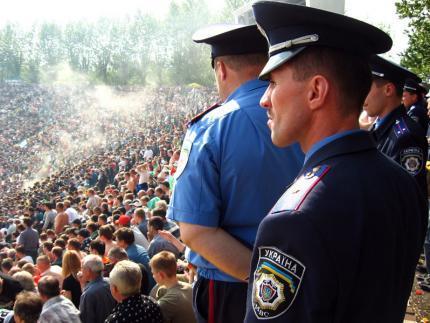
The good news is that President Viktor Yanukovych has finally gotten around to firing some of the deadbeats in his Cabinet.
The bad news is that he's replaced them with two individuals with absolutely no connection to or roots in Ukraine.
The worse news is that they've been placed in charge of the "power" agencies, the Ministry of Defense and the Security Service (SBU).
And, lest you think you can now take a breath, the worst news is that both guys have a record of violence as long as Yanukovych's security entourage.
It started on February 3rd, when Yanukovych made Igor Kalinin the head of the SBU. Then, on February 8th, he made Dmitri Salamatin minister of defense.
Kalinin joined the KGB in 1984, took part in the fighting in Afghanistan from 1986 to 1988, and remained in that august institution until 1992 (earning an Order of the Red Star along the way), when, for unknown reasons, he came to Ukraine and began teaching at the National Academy of the SBU. He stayed there until 2005, when he assumed charge of the Center for the Special Preparation of the Main Department "A" of the SBU. That bizarrely named and innocuous-sounding organization is responsible for training Ukraine's counterterrorist Alpha special forces. What Kalinin was up to after 2005 is unclear (hiding from the Orange democrats is my guess), but after Yanukovych seized power in early 2010, he put Kalinin in charge of the agency that protects senior Ukrainian officials.
Salamatin has no known record of serving in the KGB or of fighting Islamic mujahedin. Instead, his experience with violence is that of a street tough (like Yanukovych, you're no doubt cattily thinking). He's been involved in at least two brawls with opposition deputies and one outright head-bashing of an official. I even posted about him on this blog when he and some Regionnaire thugs staged a vicious pogrom in the Ukrainian Parliament on December 16, 2010. Soon after that incident, Yanukovych promoted him to the position of general director of the state company that promotes Ukraine's weapons exports.
Kalinin was born in 1960 in Moscow Province and spent most of his formative years in Russia. Salamatin was born in 1966 in Kazakhstan and spent most of his formative years there. So why place two guys with very tenuous ties to Ukraine—and with far more substantive ties to Mother Russia—in charge of the very institutions that are supposed to be defending Ukraine from what Ukrainians often refer to euphemistically as their "neighbor to the north"?
Now, it's not as if there are no competent security experts within Ukraine. Nor is it clear that Kalinin and, especially, Salamatin are boy wonders.
Both are obviously Viktor's boys, and that must be part of the explanation for their simultaneous rise to power. More important, that both have a Russian connection may mean one of two diametrically opposed things: either Yanukovych is getting set to cave to the Kremlin or the Sultan of Kyiv is drawing on tough guys who, he hopes, understand Russia and might just be able to stand up to Moscow. We'll know for sure in the months ahead.
The implications of their appointments are even more important for Ukraine domestically. The fact that both are complete outsiders can only mean that Yanukovych is expecting serious trouble at home in the coming year and doesn't think native cadres can do the job. And he's right: his legitimacy is nil, the Regionnaires are bankrupt, Russia is rebelling, and the fall 2012 parliamentary elections must be won at all costs. If this is Viktor's thinking, then he's suffering from the delusion that the cracking of heads will stem his imminent fall. It won't. It'll only accelerate it, while costing lives.
But here's the good news. Kalinin and Salamatin's being outsiders means that there's a real crisis of confidence within the Party of Regions and between the Regionnaires and Yanukovych. Ukraine has the talent, and the Regionnaires even have the talent, but the prez obviously doesn't trust anyone but his ever-shrinking coterie of cronies.
By the way, when regimes crack, their downfall is usually imminent.
Photo Credit: Водник
February 2, 2012
Media Censorship and Controlling Freedom in Ukraine
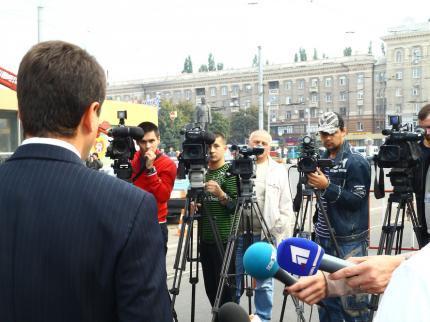
The Regionnaires' inability to understand just what freedom is and how it works was amply on display in the last few weeks. With something that elementary beyond their grasp, it's small wonder that President Yanukovych and his pals invariably elicit eye-rolling, groans, and grins when they pontificate about such things as free speech and civil society.
Back in mid-January, Ihor Huzhva, editor of the pro-regime newspaper Segodnya, was fired by the paper's supervisory council, which reports to the owner, Ukraine's richest man and a lapsed Regionnaire MP, Rinat Akhmetov. The incident was undeservedly underreported, even though Huzhva made the following sensational claims in an interview:
As far as I know, the question of my firing was decided after I refused to submit to censorship in the paper. This was last summer. That's when all my problems began. When we initiated our action [a planned strike], I knew what I was risking. But this action was the only means of breaking the system of censorship that they tried to establish in the publication. After all, our owner Rinat Akhmetov continually emphasizes his commitment to transparent rules of the game…. But, evidently, the Supervisory Council … has completely different views. And that's why I was fired: for exposing the system of censorship. Evidently, they persuaded Akhmetov that I am a dangerous mutineer who violated corporate ethics…. In actuality, I simply tried to defend those principles that SCM [System Capital Management, Akhmetov's holding company] officially declares on behalf of our publication.
So there you have it, just in case you didn't know: the media are censored in Yanukovych's Ukraine. Moreover, the country's largest newspaper, Segodnya, is censored—despite (or is it due to?) having a more or less enlightened oligarch as its owner. Did any Regionnaire politico protest? Take a wild guess.
A little after Huzhva's firing, another scandal concerning freedom of speech hit the headlines. This time it concerned a critic of Yanukovych, the Western Ukrainian writer Yuri Vynnychuk. His crime was to have recited a poem at an "Evening of Erotic Poetry" in Kyiv that expressed some pretty strong sentiments about the regime and its leader. Here's a bit, translated by Sophie Cooke:
The time has come when each of us
faces the choice times give to us:
now gangsters and liars govern,
con-men and pig-herds rule Parliament.
They have ground the state down to powder,
drunk from our veins like vampires;
now their leader, pelted with egg,
pushes us on to the cliff-edge.
A gangster before: he's a gangster now
but of a better class, the kind that are allowed.
It's not fur hats he's nicking, but public millions now—
Kill the bugger.
OK, it's not exactly Great Art, but it's a legitimate literary undertaking and, as with all controversial poetry or prose, policymakers who disagree with its sentiments are served best by ignoring it. Not so in Yanukostan, where criticism is viewed as being tantamount to aggression. The outraged Leonid Hrach, a humorless Communist (if that isn't a redundant description), immediately filed a charge of pornography and incitement to violence with the procurator's office. The Regionnaire Kharkiv Province governor, Mykhaylo Dobkin, suggested that Vynnychuk and other critically minded intellectuals were subversives acting on behalf of foreign donors. Yanukovych said nothing, perhaps because he was in Davos hoping to hobnob with anyone who doesn't yet consider him a pariah. Unsurprisingly, stupid criticism of a bad poem just made the incident even more popular, especially as Dobkin, who blasted the intellectuals for "vulgarity," conveniently forgot that he was caught on tape a few years ago cussing so hard that even a sailor would blush.
Ukraine's freedom-loving president, meanwhile, announced at the height of the Vynnychuk controversy that he was setting up a Coordination Council on Questions of Developing Civil Society. Although anyone who comes with an impossibly convoluted name like that should be disqualified from speaking on speech, the more important point is that civil society is the real thing if and only if it is free and independent of government interference. The organizations and institutions that governments promote are, well, government organizations and institutions, whereas civil society—clubs, churches, movements, and nongovernmental organizations—is non-governmental by definition. It's certainly possible for government to lay the legal groundwork for civil society, but the best way for governments to "develop" civil society is to stay out of it. And the best way for authoritarian governments to develop civil society is to disband and become democratic.
Not so, alas, with Yanukovych. The Ukrainian president, who is blind to censorship, says he really, really supports civil society. No one believes him, of course. They know that what he really, really wants is to control it.
Photo Credit: Sergik / Shutterstock.com
January 27, 2012
Who's Afraid of Yulia Tymoshenko?
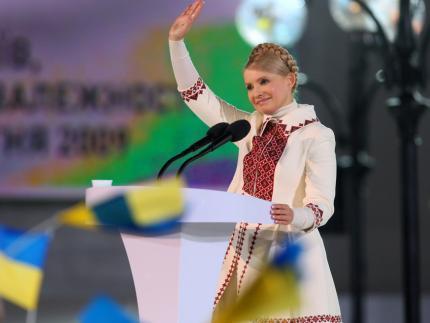
Which two Ukrainians most detest Yulia Tymoshenko, most fear her, and most obsess about her?
It's the two Viktors, of course: Yushchenko and Yanukovych.
Most Ukrainians have very strong opinions about the former prime minister turned political prisoner, but it's only the two Viktors who've let their feelings about her become borderline psychotic.
In the last three years of his presidency, 2006 to 2009, Yushchenko abandoned whatever reform aspirations that may have guided him during the Orange Revolution and concentrated almost exclusively on squabbling with and attacking Tymoshenko, never passing up an opportunity to denounce her, regardless of whether his audience was listening or cared. I personally witnessed him bore two roomfuls in New York with hour-long attacks on Tymoshenko: the first group consisting of some 50 potential American investors who wanted to hear about Ukraine's economy; the second, of some 100 Ukrainian-Americans who wanted to hear about Ukraine's culture.
Just as Yushchenko let his obsession with Tymoshenko define, and ultimately destroy, his presidency, so too has Yanukovych. After she lost the presidential election of 2010, Tymoshenko was washed up as a national politician. All Yanukovych had to do to keep her that way was to ignore her. Instead, by persecuting Tymoshenko, by jailing her at precisely the time that he's ostensibly courting Europe and hoping to negotiate a gas deal with Russia, he's given her the ethical stature she never had, undermined his standing at home and abroad, sabotaged Ukraine's attempts to integrate more closely with the European Union, and provided the Kremlin with additional reasons for stonewalling Kyiv. Like that other Viktor, this one has let his obsession with Tymoshenko define, and ultimately destroy, his presidency.
So what gives? Although Yanukovych has moved toward many of Yushchenko's positions in the last year, the fact is that the two are profoundly different presidents. Yushchenko was, despite his multitudinous faults, significantly more pro-democratic, pro-Ukrainian, and pro-market than the unabashedly anti-democratic, anti-Ukrainian, and anti-market Yanukovych. They are also very different politicians, with Yushchenko preferring the safety of a podium and Yanuovych preferring the safety of a designer suit.
Why would two such different policymakers share the same fear and loathing of Tymoshenko?
I suspect it's because they're the same kind of guys. It's not Tymoshenko the politician they hate, but Tymoshenko the too-strong woman who knows they're both pushovers and treats them as such. After all, Yushchenko knows how to deal with male enemies. He bores them to death or, as in the case of Yanukovych, cuts a deal with them.
Yanukovych's approach is even simpler, and usually involves a sock to the jaw. Neither approach works with Tymoshenko. She can run rhetorical circles around Yushchenko and knock Yanukovych off his leaden feet.
Tymoshenko, as the strong woman of Ukrainian politics, has exposed both fellas for the vain weaklings they really are. When Yushchenko lost his charms after being poisoned and disfigured in the summer of 2004, Tymoshenko not only threatened his authority and standing as president. She also threatened his manhood and his sense of self as a ladies' man. Moreover, she didn't fall for his act precisely because she wanted what he only half-wanted: power. And she never failed to pursue it, for better or for worse, while Yushchenko never failed to let it slip out of his fingers.
Yanukovych is an even more transparently self-doubting male who is also burdened with the sense of inadequacy that comes from being a hoodlum-turned-honcho. Hence the big mouth and big talk and big fists. Hence the absence of women in his prime minister's cabinet. When wife Ludmilla went off the deep end during the Orange Revolution, Yanukovych could respond only by banishing her to Donetsk. When political opponent Yulia claimed that he was a thug and a crook during the 2010 presidential campaign, he could respond only by banishing her to a jail. Small wonder that his leading female cheerleader, Hanna Herman, gets big bucks for her efforts.
Self-confident politicians and self-confident men would have treated Tymoshenko as just what she was—a strong-willed, tough, and ruthless politician—regardless of her sex. But neither Yushchenko nor Yanukovych can, evidently, see past that. And that obviously drives both fellas crazy, to the point of preferring political suicide to rational policymaking.
Tymoshenko's inevitable comeback will be a traumatic defeat for both Viktors. When the queen bee returns, expect both of them to take up bee-keeping full-time.
Alexander J. Motyl's Blog
- Alexander J. Motyl's profile
- 21 followers



